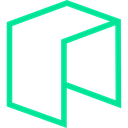-
 Bitcoin
Bitcoin $83,602.2353
-2.17% -
 Ethereum
Ethereum $1,577.6270
-3.79% -
 Tether USDt
Tether USDt $0.9999
0.02% -
 XRP
XRP $2.0682
-3.29% -
 BNB
BNB $580.5372
-1.35% -
 Solana
Solana $125.9599
-4.13% -
 USDC
USDC $0.9999
0.01% -
 TRON
TRON $0.2526
0.40% -
 Dogecoin
Dogecoin $0.1542
-3.28% -
 Cardano
Cardano $0.6077
-5.21% -
 UNUS SED LEO
UNUS SED LEO $9.3476
-0.85% -
 Chainlink
Chainlink $12.2682
-3.17% -
 Avalanche
Avalanche $18.8394
-5.46% -
 Stellar
Stellar $0.2340
-2.50% -
 Toncoin
Toncoin $2.8622
-2.26% -
 Shiba Inu
Shiba Inu $0.0...01168
-1.90% -
 Sui
Sui $2.1011
-4.06% -
 Hedera
Hedera $0.1573
-5.64% -
 Bitcoin Cash
Bitcoin Cash $322.1078
-3.54% -
 Litecoin
Litecoin $75.9738
-2.48% -
 Polkadot
Polkadot $3.5448
-3.26% -
 Dai
Dai $1.0000
0.01% -
 Bitget Token
Bitget Token $4.2295
-2.19% -
 Hyperliquid
Hyperliquid $14.9181
-7.99% -
 Ethena USDe
Ethena USDe $0.9991
0.01% -
 Pi
Pi $0.6195
-16.55% -
 Monero
Monero $218.5657
3.31% -
 Uniswap
Uniswap $5.1727
-3.85% -
 OKB
OKB $52.2344
0.01% -
 Pepe
Pepe $0.0...07065
-4.74%
How do blockchain games use oracles to enhance game functionality?
Blockchain games use oracles to integrate real-time data, generate randomness, manage assets, enhance economies, and ensure fairness, revolutionizing gaming experiences.
Apr 14, 2025 at 08:15 pm
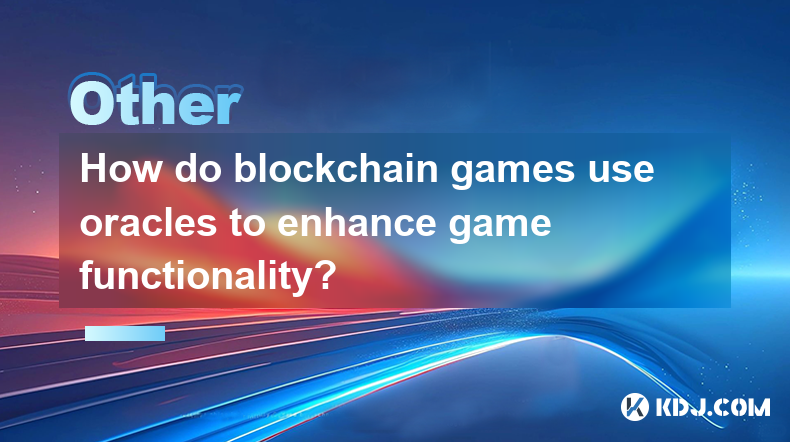
Blockchain games have revolutionized the gaming industry by integrating decentralized technologies to create more immersive and interactive experiences. One of the key components that enhance the functionality of these games is the use of oracles. Oracles serve as bridges between the blockchain and the real world, providing smart contracts with external data that is necessary for the game's operations. In this article, we will explore how blockchain games utilize oracles to enhance their functionality, covering various aspects such as real-time data integration, randomness generation, and asset management.
Real-Time Data Integration
Real-time data integration is a crucial aspect of blockchain games that rely on external information to function effectively. Oracles play a vital role in this process by fetching and verifying real-world data, which is then used to update the game state on the blockchain. For instance, a game that involves weather-based challenges might use an oracle to pull real-time weather data from a trusted source. This ensures that the game's environment is dynamically updated, providing players with a more realistic and engaging experience.
- Choose a reliable oracle service: To integrate real-time data, developers must first select a reliable oracle service, such as Chainlink or Band Protocol, that can provide accurate and timely data.
- Define the data requirements: Developers need to clearly define what data is required for the game and how frequently it should be updated.
- Set up the smart contract: The smart contract must be programmed to request data from the oracle at specified intervals and to process this data to update the game state.
- Integrate the data into the game: Once the data is received and processed by the smart contract, it must be seamlessly integrated into the game's user interface to ensure a smooth player experience.
Randomness Generation
Randomness generation is another critical function that oracles provide to blockchain games. Many games require a source of randomness to ensure fairness and unpredictability in events such as loot drops, battles, and other in-game mechanics. Traditional random number generators (RNGs) can be manipulated, but oracles can fetch random data from external sources, ensuring true randomness.
- Select a randomness oracle: Developers must choose an oracle that specializes in providing verifiable random numbers, such as Provable or Chainlink VRF.
- Implement the randomness request: The smart contract should be designed to request a random number from the oracle at the appropriate time in the game.
- Verify the randomness: Once the random number is received, the smart contract must verify its integrity to ensure it has not been tampered with.
- Apply the randomness to game mechanics: The verified random number is then used to determine outcomes in the game, such as the results of a battle or the items dropped by an enemy.
Asset Management
Asset management in blockchain games often involves the use of oracles to track and manage in-game assets that have real-world value. For example, a game that features digital collectibles might use an oracle to verify the authenticity and ownership of these assets. This ensures that the assets are securely managed and that players can trust the integrity of their in-game purchases.
- Identify the assets to be managed: Developers must first identify which in-game assets require external verification and management.
- Choose an appropriate oracle: An oracle that specializes in asset verification, such as Chainlink or Oraclize, should be selected.
- Set up the asset tracking system: The smart contract must be programmed to interact with the oracle to track and verify the status of the assets.
- Integrate asset management into the game: The game's user interface should be updated to reflect the status of the assets, ensuring that players can easily manage and trade them.
Enhancing Game Economies
Enhancing game economies is another area where oracles play a significant role. Blockchain games often feature complex economies that require external data to function effectively. Oracles can provide data on market prices, exchange rates, and other economic indicators that are used to adjust in-game economies dynamically.
- Determine the economic indicators needed: Developers must identify which economic indicators are necessary for the game's economy to function smoothly.
- Select an economic data oracle: An oracle that provides reliable economic data, such as Chainlink or Band Protocol, should be chosen.
- Configure the smart contract to use economic data: The smart contract must be programmed to request and process economic data from the oracle.
- Adjust the game economy based on the data: The game's economy should be dynamically adjusted based on the data received from the oracle, ensuring a balanced and engaging experience for players.
Ensuring Fairness and Transparency
Ensuring fairness and transparency is a fundamental aspect of blockchain games, and oracles contribute significantly to this goal. By providing verifiable external data, oracles help maintain the integrity of the game's mechanics and ensure that all players are treated fairly. For example, an oracle can be used to verify the results of a competition or to ensure that the distribution of rewards is transparent and unbiased.
- Define the fairness criteria: Developers must clearly define what constitutes fairness in the game and how oracles can help achieve this.
- Select an oracle for fairness verification: An oracle that specializes in providing verifiable data, such as Chainlink or Provable, should be chosen.
- Implement the fairness verification process: The smart contract must be programmed to request and process data from the oracle to verify the fairness of game events.
- Communicate the results to players: The results of the fairness verification should be communicated to players through the game's user interface, ensuring transparency and trust.
Frequently Asked Questions
Q: Can oracles be used to prevent cheating in blockchain games?
A: Yes, oracles can help prevent cheating by providing verifiable external data that ensures the integrity of game mechanics. For example, an oracle can be used to verify the randomness of events or the authenticity of in-game assets, making it difficult for players to manipulate the game.
Q: How do developers ensure the security of data provided by oracles?
A: Developers ensure the security of data provided by oracles through several methods, including using reputable oracle services, implementing data verification mechanisms within smart contracts, and employing cryptographic techniques to ensure data integrity.
Q: Are there any limitations to using oracles in blockchain games?
A: Yes, there are some limitations to using oracles in blockchain games. These include potential delays in data retrieval, the cost associated with oracle services, and the reliance on external data sources, which can introduce vulnerabilities if not properly managed.
Q: Can players interact directly with oracles in blockchain games?
A: Typically, players do not interact directly with oracles in blockchain games. Instead, the interaction is managed through smart contracts that request and process data from oracles. However, some games may provide players with visibility into the data provided by oracles to enhance transparency.
Disclaimer:info@kdj.com
The information provided is not trading advice. kdj.com does not assume any responsibility for any investments made based on the information provided in this article. Cryptocurrencies are highly volatile and it is highly recommended that you invest with caution after thorough research!
If you believe that the content used on this website infringes your copyright, please contact us immediately (info@kdj.com) and we will delete it promptly.
- Avalon Labs Has Launched the Institutional Yield Layer on Bybit Earn, Opening Bitcoin to DeFi
- 2025-04-16 14:25:14
- Chipmaking giants Nvidia and AMD have seen their share prices slide
- 2025-04-16 14:25:14
- ChatGPT-4.5, OpenAI's Latest Innovation, Has Reached a Decisive Milestone by Passing the Turing Test with an Impressive Success Rate of 73%
- 2025-04-16 14:20:12
- Bitcoin (BTC) Price Up 9% Over The Past Week, Targeting $90,000 Resistance
- 2025-04-16 14:20:12
- A crypto game inspired by Monopoly is reportedly on the horizon
- 2025-04-16 14:15:13
- A Stablecoin To Beat Inflation?
- 2025-04-16 14:15:13
Related knowledge
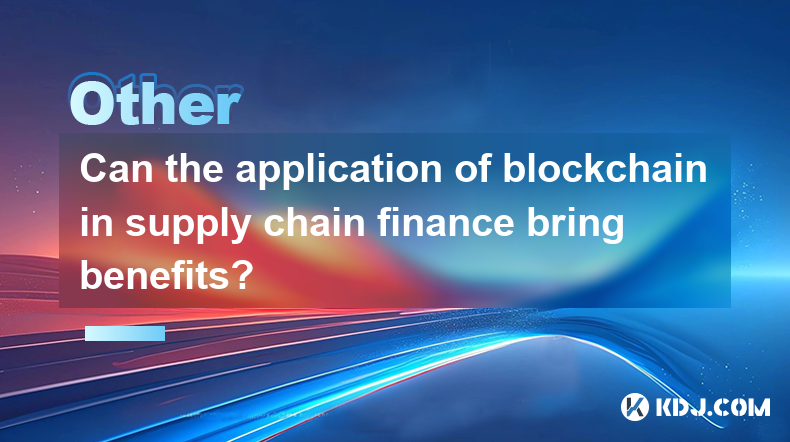
Can the application of blockchain in supply chain finance bring benefits?
Apr 15,2025 at 04:00pm
Can the application of blockchain in supply chain finance bring benefits? The integration of blockchain technology into supply chain finance has garnered significant attention in the cryptocurrency and financial sectors. This article explores how blockchain can potentially revolutionize supply chain finance, detailing its benefits and providing a compre...

Does the ranking of Chinese blockchain apps include cross-chain applications?
Apr 14,2025 at 04:00pm
The ranking of Chinese blockchain apps is a comprehensive evaluation that takes into account various aspects such as user base, transaction volume, and technological innovation. A pertinent question arises regarding whether these rankings include cross-chain applications. Cross-chain applications, which allow different blockchain networks to interact an...
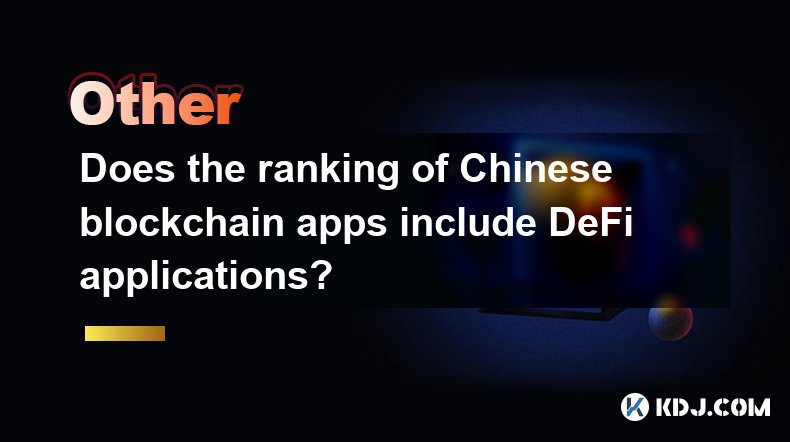
Does the ranking of Chinese blockchain apps include DeFi applications?
Apr 15,2025 at 06:57am
The ranking of Chinese blockchain apps is a comprehensive list that showcases the most popular and influential applications within the cryptocurrency ecosystem. One question that often arises is whether these rankings include DeFi applications. To answer this, we need to delve into the specifics of how these rankings are compiled and what types of appli...
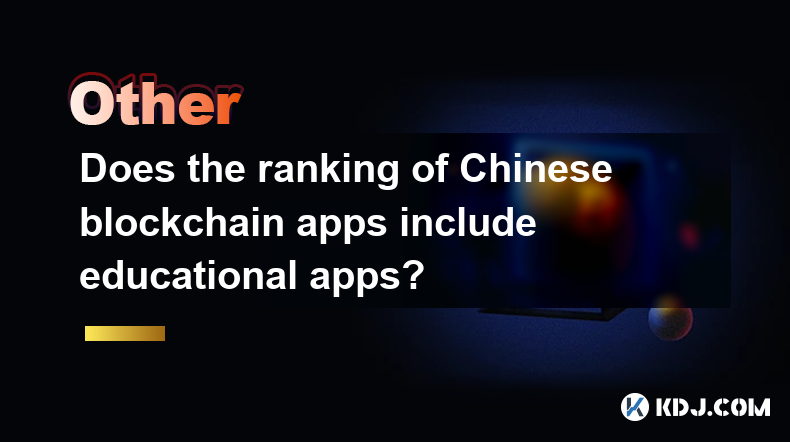
Does the ranking of Chinese blockchain apps include educational apps?
Apr 16,2025 at 03:35am
The ranking of Chinese blockchain apps often includes a variety of categories, from finance and gaming to social networking and beyond. One question that frequently arises is whether these rankings include educational apps. To address this, we need to delve into the specifics of how blockchain apps are categorized and ranked in China, and whether educat...
Does the ranking of Chinese blockchain apps include enterprise-level applications?
Apr 15,2025 at 06:42am
The ranking of Chinese blockchain apps often includes a variety of applications, ranging from consumer-focused to enterprise-level solutions. Understanding the scope and criteria for these rankings is essential to determine if enterprise-level applications are included. This article delves into the specifics of how Chinese blockchain app rankings are co...
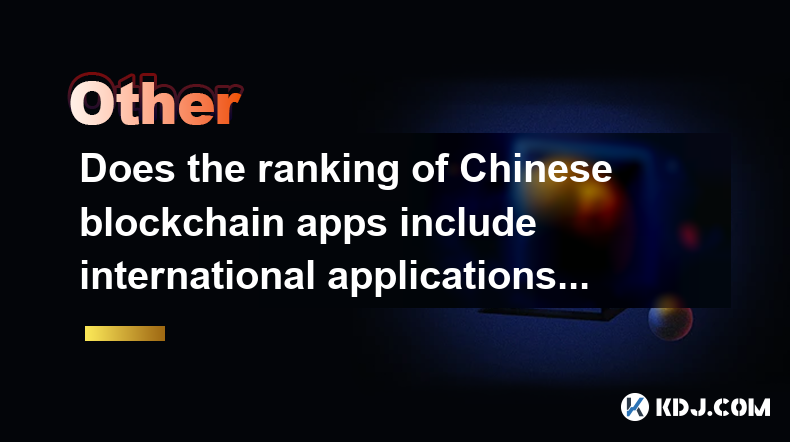
Does the ranking of Chinese blockchain apps include international applications?
Apr 16,2025 at 04:07am
The ranking of Chinese blockchain apps primarily focuses on applications developed and predominantly used within China. However, the question of whether these rankings include international applications is an intriguing one that warrants a detailed exploration. In this article, we will delve into the criteria used for ranking Chinese blockchain apps, th...

Can the application of blockchain in supply chain finance bring benefits?
Apr 15,2025 at 04:00pm
Can the application of blockchain in supply chain finance bring benefits? The integration of blockchain technology into supply chain finance has garnered significant attention in the cryptocurrency and financial sectors. This article explores how blockchain can potentially revolutionize supply chain finance, detailing its benefits and providing a compre...

Does the ranking of Chinese blockchain apps include cross-chain applications?
Apr 14,2025 at 04:00pm
The ranking of Chinese blockchain apps is a comprehensive evaluation that takes into account various aspects such as user base, transaction volume, and technological innovation. A pertinent question arises regarding whether these rankings include cross-chain applications. Cross-chain applications, which allow different blockchain networks to interact an...

Does the ranking of Chinese blockchain apps include DeFi applications?
Apr 15,2025 at 06:57am
The ranking of Chinese blockchain apps is a comprehensive list that showcases the most popular and influential applications within the cryptocurrency ecosystem. One question that often arises is whether these rankings include DeFi applications. To answer this, we need to delve into the specifics of how these rankings are compiled and what types of appli...

Does the ranking of Chinese blockchain apps include educational apps?
Apr 16,2025 at 03:35am
The ranking of Chinese blockchain apps often includes a variety of categories, from finance and gaming to social networking and beyond. One question that frequently arises is whether these rankings include educational apps. To address this, we need to delve into the specifics of how blockchain apps are categorized and ranked in China, and whether educat...

Does the ranking of Chinese blockchain apps include enterprise-level applications?
Apr 15,2025 at 06:42am
The ranking of Chinese blockchain apps often includes a variety of applications, ranging from consumer-focused to enterprise-level solutions. Understanding the scope and criteria for these rankings is essential to determine if enterprise-level applications are included. This article delves into the specifics of how Chinese blockchain app rankings are co...

Does the ranking of Chinese blockchain apps include international applications?
Apr 16,2025 at 04:07am
The ranking of Chinese blockchain apps primarily focuses on applications developed and predominantly used within China. However, the question of whether these rankings include international applications is an intriguing one that warrants a detailed exploration. In this article, we will delve into the criteria used for ranking Chinese blockchain apps, th...
See all articles




















































































